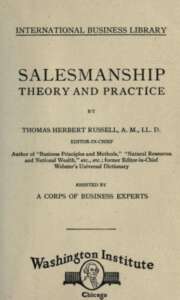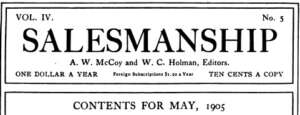The Future of Sales – A counterintuitive perspective at how the sales profession has not changed, how it is changing, and opportunities to take advantage…
“Buyers know more nowadays!”

Salesmanship, Thomas Herbert Russell 1912
Articles, social media posts, podcast episodes, and even entire books have been dedicated to this challenge above and its implications on the selling world. Would you be surprised to hear that this quote was written by Thomas Herbert Russell in his 1912 book, Salesmanship?
In the 120 years of the “modern” selling profession, you’ll find the objections, negotiation tactics, and prospecting approaches are nearly word-for-word the same today. Ironically, even today’s newfound challenges of remote sales leadership were present then. The original sales leaders were remote sales leaders, rarely if ever seeing their salespeople, and doing it all without telephones, email, or a CRM solution.
“But, Todd”, you add, “we’re undergoing a massive sales tech revolution right now. That’s changing everything!” Is it? It’s true that the preponderance and availability of sales technology have exploded, but I would argue that the greatest tech explosion to ever hit the sales profession was the telephone, followed closely by the proliferation of email.
Yes, the environment for how buyers buy has changed quite dramatically, but not in the ways you might think.
We are all consumers. We are all buyers. We all make decisions regarding what we need, and what we are willing to invest (time, resources, money) to get that stuff. The way we make decisions, the way we prioritize, and the way we ultimately buy have not changed. Ever. It’s the circumstances that have changed.
Change 1: The Inputs
There is no doubt about the proliferation of inputs available to buyers today. Information on potential options and solutions to business issues are everywhere. Need to find reviews on those options? They’re everywhere, too. Want to network with others who have experienced similar issues and invested in various solutions? Never easier.
This information availability explosion started in the 1990s. In 2015, Forrester was predicting one million B2B sales jobs would be eliminated by the year 2020. But quite the opposite has happened. Instead of putting the sales profession in peril, it’s done the opposite. The supply of salespeople can’t even keep up with the demand. Why?
More inputs and information haven’t proven to be better for the buyers. The opposite has proven to be true.
“The single biggest challenge of selling today is not selling, it is actually our customers’ struggle to buy.” – Brent Adamson, Gartner
Thus, an opportunity!
It starts with an understanding of how we buy. We don’t buy when we’re convinced (well, if we do, we’re not happy about it). We buy when we can predict. We listen. We do homework. We consider whether a purchase will be worth the investment in our time, resources, and dollars versus alternative solutions or even alternative priorities.
The most successful sellers and organizations will shift their approach and perspective to helping customers predict. The most successful sellers and organizations will succeed by earnestly doing the homework for the buyers, whether the conclusion is for them to move forward with your solution…or not. If you were in the buyer’s shoes, what would you be concerned about with your solution? What are you giving up? What is your core? What are you going to love? What does the journey to the reward look like? How do we remove friction from the journey? Share it. Present it. Yes, both the pros and THE CONS.
With this shift in mind, where more information availability has made buying harder, a shift in perspective of what a salesperson needs to be is required. Instead of a necessary evil, there’s an opportunity to become a welcome asset and resource – through clinical levels of empathy…not pitches.
Buyers consume and process information to form an opinion, but what if they can’t trust the source of the information they’re consuming? More homework for them. Longer buying cycles. More frequent decisions for the status quo. You win less often, the losses will take longer to be made official. The result – higher hard dollar costs, and opportunity costs.
“Be human. The reason you are hired to sell goods is that you are a human being. Otherwise your employer would have sent a catalogue.” – Dr. Frank Crane, Commandments of Salesmanship, 1918
Today’s environment requires setting those proper predictions and expectations, then consistently meeting them. When you do, the channels by which your customers share and advocate have also multiplied. The reward? More buyers who stay, buy more, and advocate.
Change 2: The outputs
“Signing a buyer’s name to an order does not close the sale. That is merely the opening process. To make that sale stick – to allow the salesperson to travel that way again, requires the co-operation
Salesmanship Magazine Header, May 1905
of every department of the business.” – Salesmanship Magazine, 1905.
The second pronounced change in the selling world is the shift in outputs, primarily through the shift to a subscription economy. While this quote above was a mindset of successful organizations 117+ years ago, selling was still traditionally “sell-and-go”. The world has shifted to a (fill-in-the-blank)-as-a-service ((X)AAS) economy. The majority of investments are in solutions where the sale is the formal beginning of the relationship, not the peak. Expectations are set, and the bulk of the total contract value comes in the out-years instead of the first year through renewals, upsells, and growth.
In the (X)AAS world, profitability isn’t realized in year one. Profitability is achieved in years 2, 3, or even later. Achieving profitability with a client means considerably more than just getting the sale as was the case even thirty years ago.
The sustainability and long-term viability of a company now depend on the changed dynamics of the sale itself. Profitability is only achieved if the output of the sale results in a customer who stays, buys more, and advocates. And, the blowhorn capability of those customers to share negative experiences as an output has far-reaching consequences.

Arthur Sheldon
The future of sales, and the companies that are most likely to succeed if and when the economy slows down, will be those who are focused on expectation setting, not convincing. The most successful salespeople are those who focus on helping buyers to predict, doing so as quickly and efficiently as possible, caring less about whether it’s with your organization or through another option. They’ll do the homework for the buyer. By doing so, they’ll differentiate in the way they sell, becoming an asset to buyers instead of a necessary evil. Those salespeople will also optimize their own efficiency by spending more of their time on opportunities that are a better match or looking for more.
“True salesmanship is the science of service. Grasp that thought firmly and never let go.” – Arthur Sheldon, The Art of Selling, 1911
Todd Caponi is the author of the 3x best-book-award-winning and international best-seller, The Transparency Sale and a speaker & workshop leader as Principal of Sales Melon LLC. Todd is also a multi-time C-Level sales leader, a behavioral science and sales history nerd, and has guided two companies to successful exits. His next book, The Transparent Sales Leader, is planned for Summer of 2022.







0 Comments